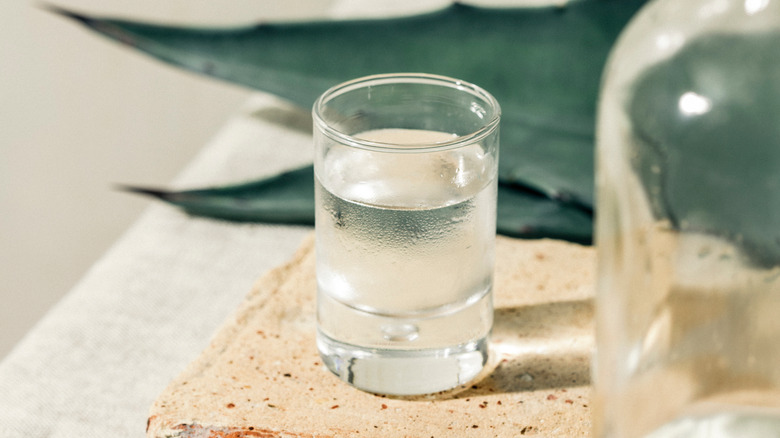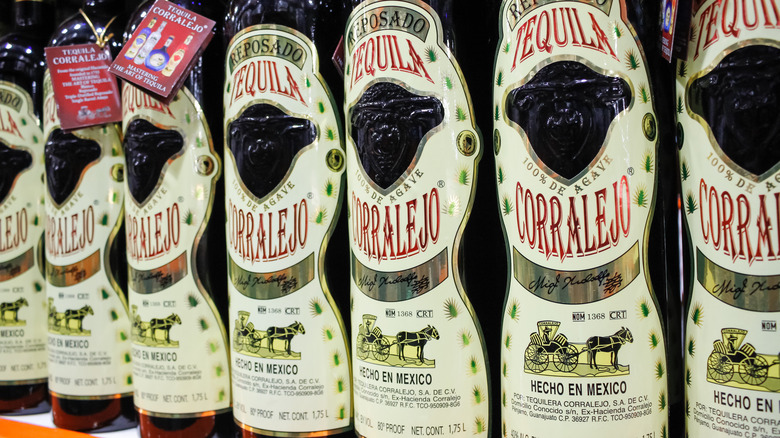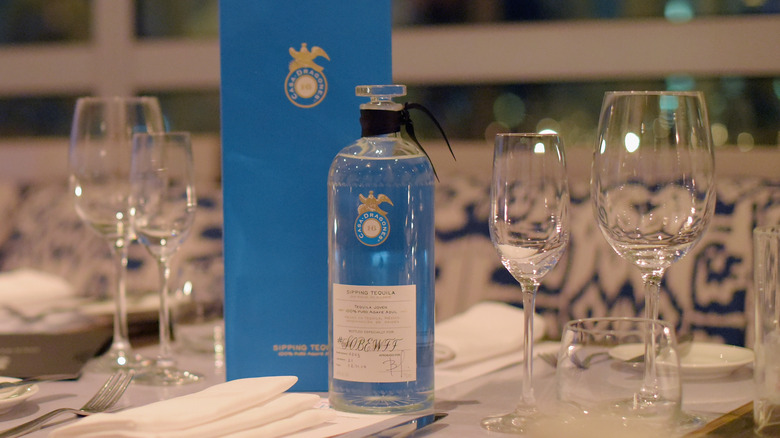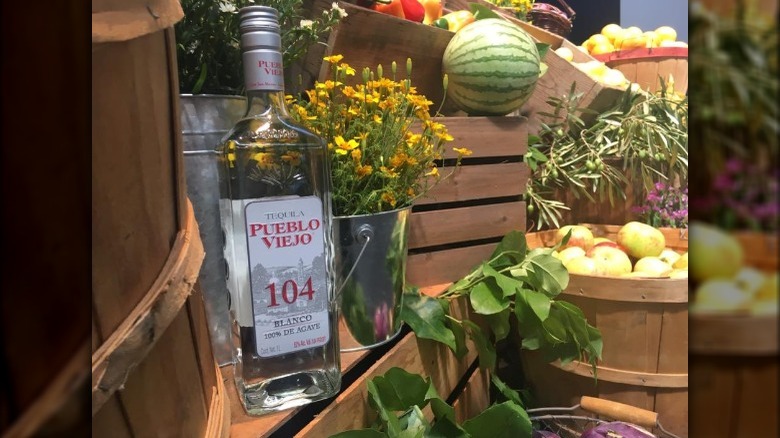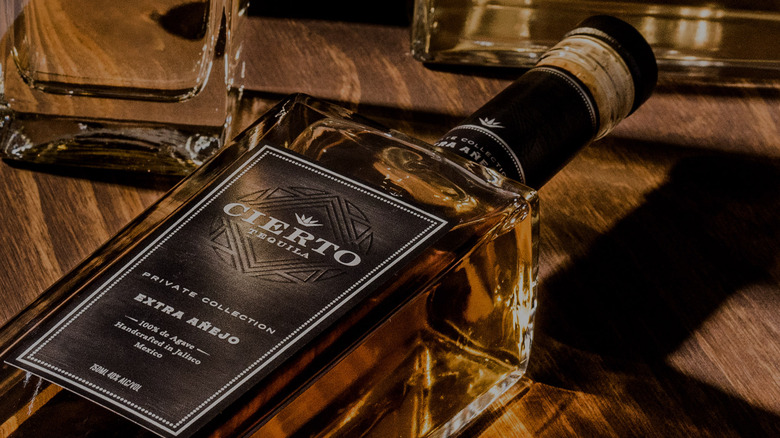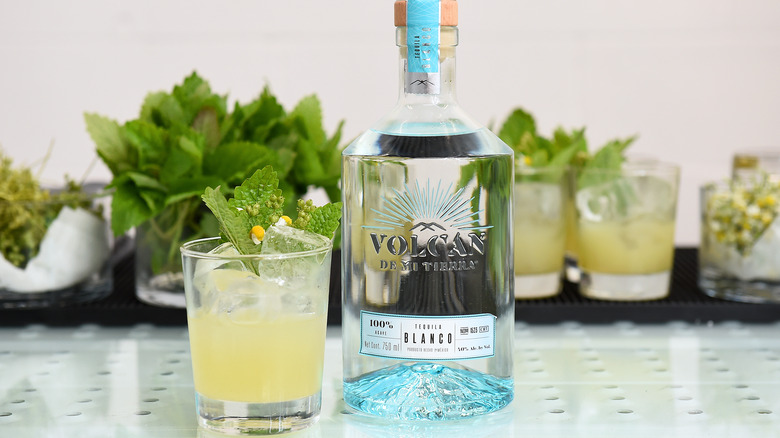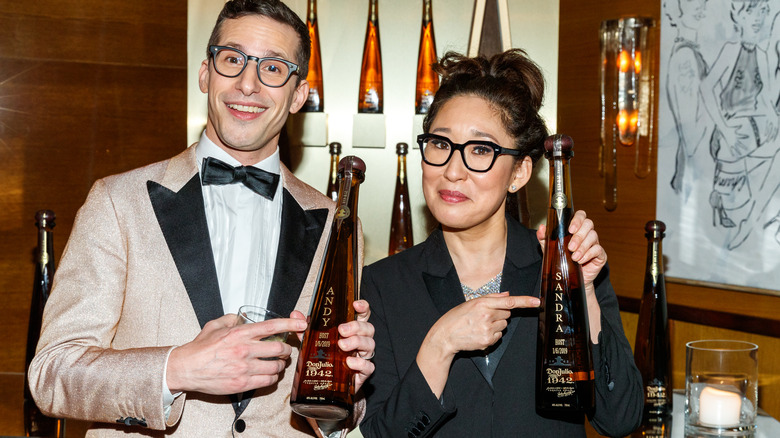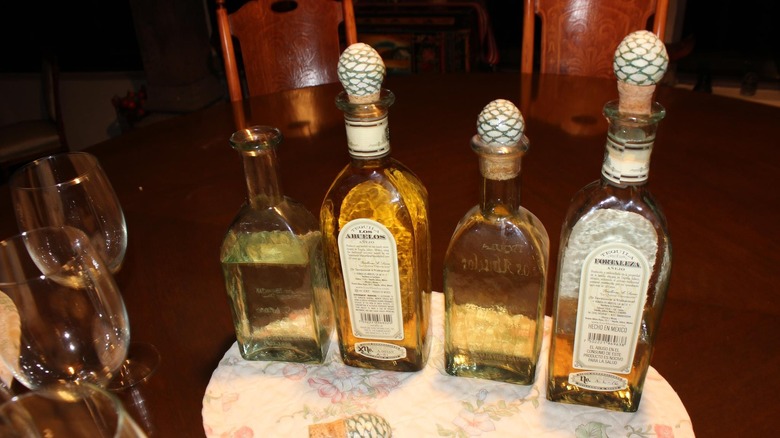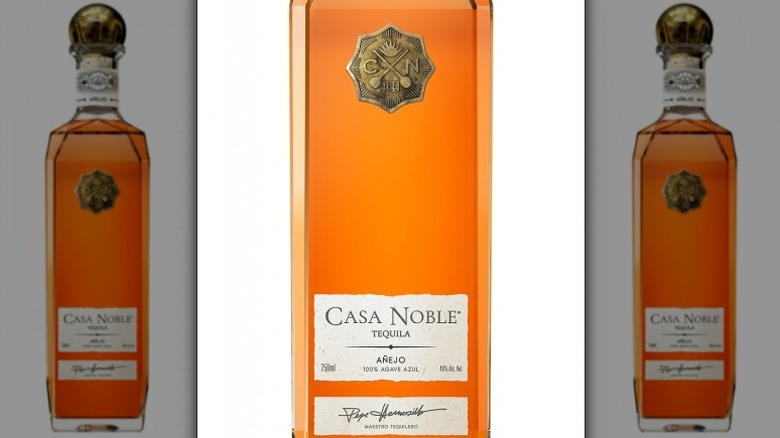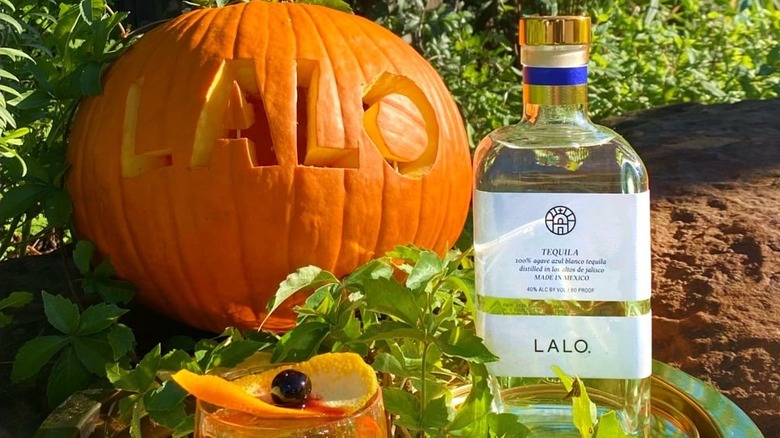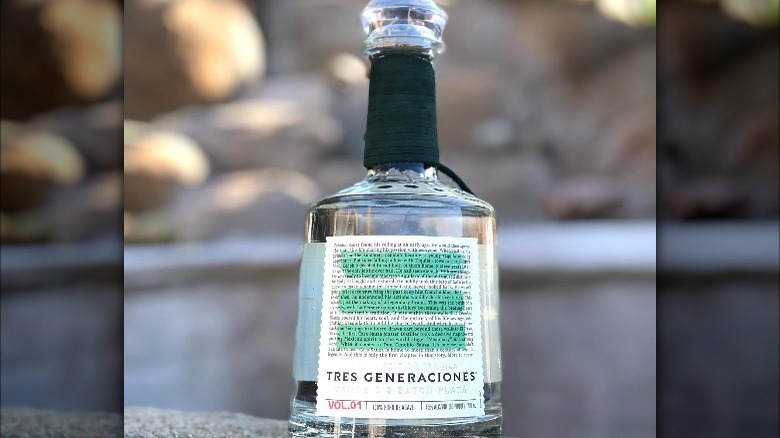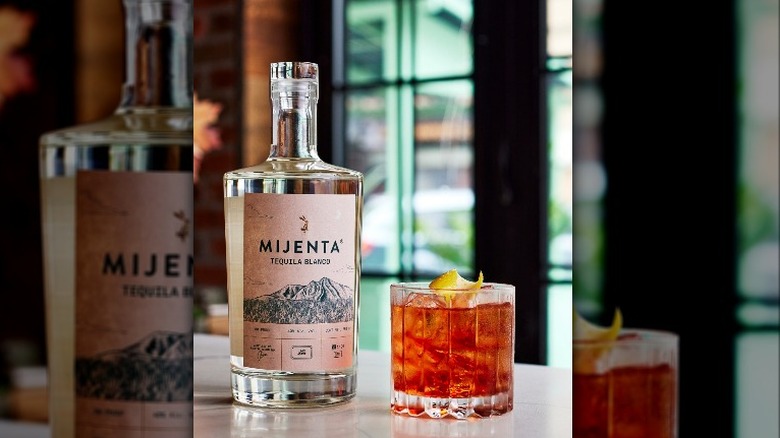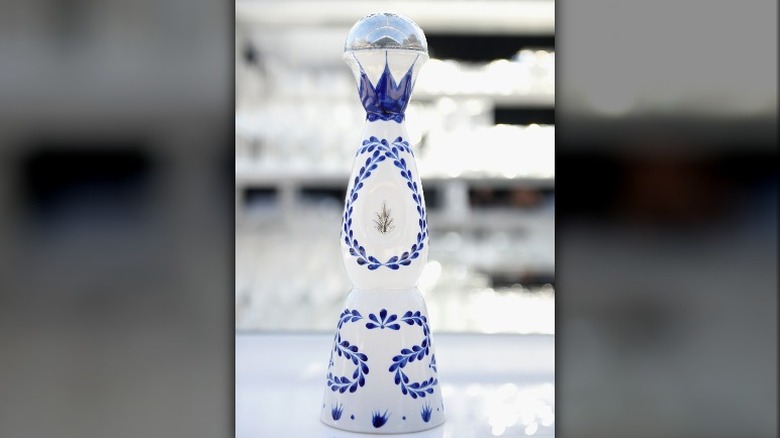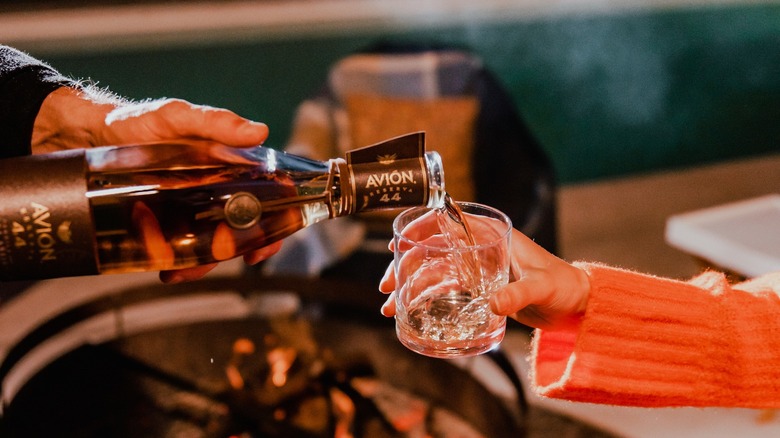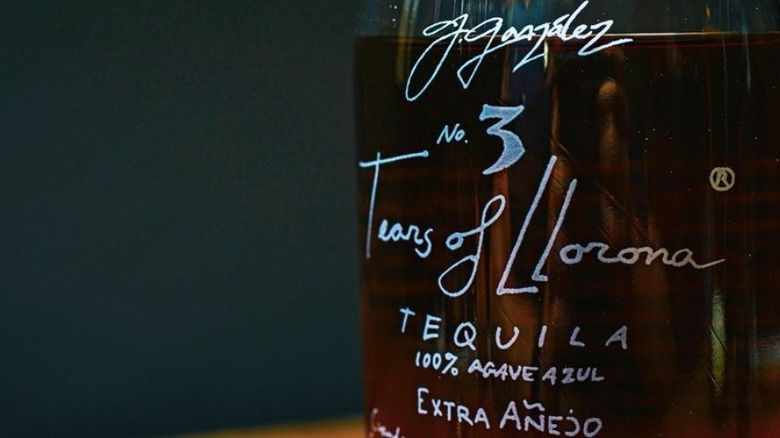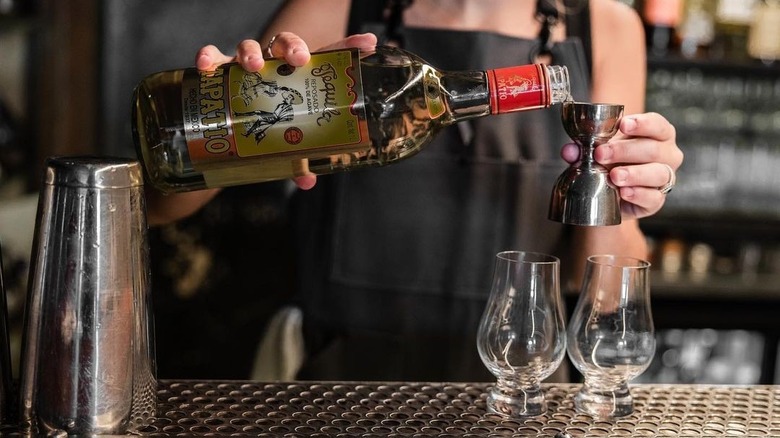15 Best Sipping Tequilas To Try In 2022
If you've ever had a headache the morning after drinking tequila, you'll understand why spirits made for savoring can be a revolutionary experience. Not all tequilas are equal, and if you're a fan of this liquor, there are plenty of tequila styles and brands to explore. High-end tequilas should be crafted with elevated ingredients and served alone, like a cognac or scotch.
The Mexican government regulates tequila production to one of five Mexican states, including only spirits made with 100% blue Weber agave distilled with no more than 49% sugar. Any bottles not labeled as such should be considered a mixto, a cheaper variety due to the inclusion of additional sugars, coloring, and glycerin. Our selections include the traditional blanco, joven, reposado, añejo, and extra añejo styles. Several others range from unaged blanco styles to the extra, or ultra, category of añejo, designated in 2006 and aged a minimum of three years.
Our selections focus on underrated and standout tequila varieties designed to be relished as is — even if priced well enough that you won't feel guilty mixing a cocktail. Because of the strict distillation method, tequila served neat lacks carbohydrates, sugar, and fat while having 97 calories per 1.5 fluid ounces. You won't even need to reach for the lime or salt.
Corralejo Reposado Tequila
This brand is known for its signature look featuring vibrant bottles. Tequila Corralejo is a staple brand for its authenticity, price point, and flavor. Corralejo is a family-owned brand making spirits in a hacienda founded in 1755 as the first commercial tequila producer in Mexico. The historic brand offers blanco, reposado, and añejo styles all for around $30 per bottle, in addition to other high-end varieties. In addition to a smokiness, Forbes recommends Corralejo Reposado's aged style for its "notes of caramel and vanilla and a lingering pepperiness." You may also find notes of pepper in each of the brand's traditional styles.
Tequila Reposado Corralejo still offers a mild flavor of citrus and vanilla flavors absorbed from the American oak barrels. Drinkers can also expect a smooth taste and golden color from the double distillation. It's worth experimenting if you also want to try the blanco and añejo styles. Añejo Corralejo increases the smoke factor thanks to 12 months of fermenting in oak and is an attractive option for the price.
Casa Dragones Joven
Casa Dragones Joven has set itself apart by producing premium, small-batch tequila blends of silver and extra-aged spirits. Joven is a category defined by the mix of unaged and aged tequila. The $300 price tag means you're going to want to savor the rich body with hints of vanilla, pear, and spice. We find the finish to be bright and clean. The tasting notes also mention a bit of hazelnut. Adding to the allure, the small-batch Joven tequila bottles are hand engraved and made in quantities of only 500 to control quality.
Casa Dragones is located in the city of San Miguel de Allende, a UNESCO World Heritage Site found in the central highlands of Mexico. La Casa Dragones is housed in what were the stables of the famed Dragones Cavalry — an influential force in the country's independence, according to the brand. Casa Dragones also sets itself apart for its founder Bertha Gonzalez Nieves, who was the first woman to be a certified Maestra Tequilera by the Academia Mexicana de Catadores de Tequila. Try the brand's blanco if you prefer only unaged tequila, named by many as the top pick for "Best Blanco Tequila."
Tequila Pueblo Viejo Blanco
Not all sipping tequilas need to be expensive. Pueblo Viejo Blanco is one underrated tequila that spirits experts consistently recommend: As an unaged tequila, it's a great value option. Before she joined Pueblo Viejo, Tequila Aficionado called creator Carmen Alicia Villarreal Treviño the "Original Tequila Boss Lady." Viejo Blanco is considered a workhorse spirit because this herbaceous and cost-effective tequila can be either sipped or used in a cocktail. Wine Enthusiast finds the tequila surprising for floral and fruit notes that "suggest a grappa or pisco rather than a classic Tequila."
As of writing this article, Pueblo Viejo makes four styles, with its blanco as the flagship variety. The brand's agave is grown in the highlands of Jalisco and is harvested every 7 to 10 years at Casa San Matías. Pueblo Viejo Blanco features the flavor of caramel from the cooked agave and a blend of fruit notes, resulting in a long finish. You also might notice an aroma of cooked agave, green apple, and citrus, but we won't blame you if the smooth flavor is what catches your attention. The maker's branding is as refreshing as its tequila — a departure from other brands — thanks to its contemporary aesthetic that isn't afraid to market to women.
Cierto Tequila Reserve Collection Extra Añejo
If you haven't heard of Cierto Tequila, you're going to want to pay attention. Cierto took home top prize at the World Tequila Awards in 2020 for its Reserve Collection Extra Añejo — in addition to taking top honor for its category. Forbes reports that judges called the reserve "classy and restrained" — who doesn't want that vibe from their tequila? The Reserve Collection Extra Añejo has also won international spirit awards in New York, San Diego, and Denver. The extra-aged tequila is said to offer a balance of wood from the barrel and "spirit on the tongue," but maintains a smooth and soft texture and finish.
The tequila maker isn't lacking in acclaim. Cierto Tequila as a brand claims to have won 473 medals in just three years. Cierto now declares a total of 506 awards to date. Master distillers at the La Tequileña distillery are fourth-and-fifth-generation agaveros, or agave growers, with their families cultivating the plant since the 1800s. The distillery is located in the town of Tequila, using only Highland plants that are twice filtered and oxygenated to acquire its flavor.
Volcan de Mi Tierra Tequila Cristalino
Cristalino tequila is a newer adaptation to the handful of regulated tequila categories. The brand's cristalino is an añejo and extra añejo blend filtered through charcoal to eliminate some of the brown color left from aging in wood barrels. The site says filtering charcoal is a more common technique to concentrate flavor in other spirits, such as whiskey, vodka, or bourbon. Volcan's Cristalino tequila is aged in barrels that once housed whiskey or cognac, says Travel Distilled. The mix creates a distinct flavor of spice, vanilla, and chocolate. We find notes of caramel and vanilla with hints of sweetness that don't overpower the agave.
Volcan de Mi Tierra attributes the taste to the agave harvested from Las Regiones Valles y Altos, combining a blend of highland and lowland agave plants. The brand appears to select only what it deems the best of the land for its spirits, taking inspiration from the rich soil in the state of Jalisco believed to have benefited from the Tequila Volcano.
Don Julio 1942
As a consistent staple in the tequila industry, Don Julio could be considered a workhorse in its own way. As a labor of love, Don Julio 1942 is aged for a minimum of two and a half years. This variety of the famous brand earned its moniker for the year that founder Don Julio González started making his spirits. The 1942 tequila is known for its tall, brown bottle, which might be confused for wine or champagne at first glance, along with its rich flavor of vanilla and oak. Don Julio 1942, along with other brands of aged tequila, have been so popular that pandemic shortages have been making the spirits scarce.
The Don Julio brand might be a giant in the tequila industry, but it appears to remember its roots. The Don Julio Fund pledged $1 million over four years to benefit the same communities that helped develop its label, as well as an offer of funding to entrepreneurs that carry on the spirit of the original Don Julio. The tequila is still produced in Atotonilco El Alto, the hometown of its founder, located in the Highlands of Jalisco. The fund will support entrepreneurs and nonprofits like No Us Without You and the Restaurant Workers Community Foundation.
Fortaleza Reposado
Tequila Fortaleza might appear to be a more recent addition to the long list of makers in the Jalisco region, but its connections to the industry are deep. The tequila brand is run by the great-great-grandchildren of Don Cenobio, who founded his first distillery in Tequila, Jalisco, in 1873. Cenobio became known for his Sauza Tequila Import Co., which ran as a family business that introduced numerous innovations to the tequila industry. Fortaleza says that Cenobio's descendent, owner Guillermo Sauza, began work to revamp the family distillery in 1999, using the same tequila-making equipment of copper stills and tahona stone mills as his ancestor. Fortunately, despite Guillermo's grandfather selling the company, the family kept the original land and distillery, so Fortaleza is made on a historic site and uses two original copper stills from 100 years ago.
Even the very packaging of Fortaleza Reposado evokes an old-world feel, thanks to hand-blown bottles with a topper reminiscent of a harvested agave plant. You'll find aromas of citrus, caramel, butter, cooked agave, and sage. The flavors include vanilla, apple, earth, and cinnamon to complement the cooked agave. The reposado is aged in American Oak barrels, twice distilled, and fermented in open-air wood tanks.
Casa Noble Añejo
Selecting Casa Noble for the list is a no-brainer, but choosing just one style of Casa Noble is a much harder task. The brand's blanco has led as the winner in a New York Time's taste test, while the añejo has been honored in other spirit competitions. The luxury site holds out for the Casa Noble Alta Belleza, sampled at the distillery and noted for its $1,200 per bottle price tag. You don't need to be a fine collector of spirits to enjoy a solid sipping tequila from the Casa Noble. InsideHook reports that a redesign in 2021 not only updated the bottle but also seems to have delivered a more refined taste than earlier tasting experiences by the site.
Official tasting notes from Casa Noble say that the añejo blend ages in new French oak for two years, and tastes of toasted oak, butterscotch, and spice. We also recommend the Casa Noble Reposado because it's made with 100% agave, made from organic agave, and fermented in French white oak barrels for almost one year (missing one day!). This reposado is almost an añejo, but you might notice a milk chocolate taste with a hint of sweetness and plenty of spice that induces cinnamon, allspice, and a pepper finish. The reliable flavor makes Casa Noble Reposado a solid sipping tequila.
LALO Tequila
LALO Tequila is celebrated for offering a distinct small-batch blanco tequila from Guadalajara. The title "Lalo" is taken from a nickname for the founder, Eduardo González, given to him by his grandfather Don Julio — you might have heard of him. LALO is an unaged, clear tequila distilled only twice to preserve the agave. The aroma offers hints of sweet potato, cinnamon, and dulce de leche, while the taste features tropical fruit and citrus. Although the brand recommends sipping neat or on the rocks, it also isn't precious about its fine crafted spirit: Try the blanco with some soda or tonic if you prefer to cut the taste. This tequila is designed for all-the-time drinking instead of just on special occasions.
LALO is crafted in Los Altos de Jalisco, Dallas News reports, the same state where González was raised around the family's premium tequila business. According to Dallas News, González partnered with David Carballido to make a few bathes for friends and family, which resulted in an expansion once word got around. In a twist of fate, Jim McDermott met the founders with a mission to bring LALO Tequila to Texas, and is now a co-founder, CEO, and Carballido's husband. Talk about keeping it in the family!
Tres Generaciones Cenobio's Batch Plata
Tres Generaciones was established in 1973, though it is less known in the U.S. than its sister brands Sauza and Hornitos tequila. Tres Genraciones is owned by Beam Suntory Inc., a global spirits company named after its flagship bourbon brand Jim Beam and Japanese whisky brand Suntory. The company also makes plata, añejo, and reposado styles in addition to limited-edition series, such as Cenobio's Batch Plata. The unaged Batch Plata tequila takes its name and pays homage to the founder of the Sauza brand, Don Cenobio. The brand says its agave is hand-selected by a master distiller after six to eight years, and the agave is freshly pressed before cooking to eliminate bitterness while preserving the plant's flavor. The Tres Generaciones Plata is triple distilled with citrus and floral notes. The taste offers a bit of spice with a pepper finish.
Drink Hacker calls the Batch Plata "extremely smooth" with a light and balanced sweetness. If you can't find the limited-edition variety, Spirit Animal recommends the Tres Generaciones Añejo for its nuttiness and "vibrancy," even if the start doesn't present as well as some other styles by the brand. Añejo Cristalino is recommended for anyone who wants to try the new trend in tequila, even though we prefer some of the others on this list.
Mijenta Tequila Reposado
Mijenta Tequila produces two premium spirits in small batches with environmental sustainability in mind. Sustainability is a term thrown around a lot these days, but Mijenta isn't greenwashing. Vinepair explains that sustainability director and co-founder Elise Som leads on decisions like printing with vegetable ink and reusing waste from the agave plant for the packaging. Oh, and did we mention this tequila is carbon neutral? Mijenta is also a B Corp that preserves the heritage and skills around the jimador tradition. Jimadores are the farmers whose job it is to harvest agave plants from the field.
Mijenta Tequila's artisanal spirits are crafted under the guidance of Maestra tequilera Ana Maria Romero, produced in the highlands of Jalisco, and rested in American white oak and European oak barrels. The reposado is aged for up to six months. You can expect notes of cantaloupe, honey, and cinnamon, as well as a complex aroma and "generous" finish.
The Mijenta Reposado is soft and strives to balance the fresh agave and the barrel aging. While peppery on the nose, drink reviewers also say honeyed peach and citrus are tasted upfront while the "punch of barrel char" at the finish is complemented by fruit.
Clase Azul Reposado Tequila
If you haven't tried Clase Azul, you might have at least noticed its white ceramic decanter, hand-painted with cobalt blue details at the bar. Each bottle is unique thanks to the individualized process, but in this case, what's inside is even more exciting. Clase Azul Reposado is considered a premium variety aged eight months in American whiskey casks. The whiskey barrel aging process creates hazelnut and vanilla flavors. You also might detect hints of clove, cinnamon, and an overall smooth character in the spirit.
Some might say that Clase Azul is the type of tequila you only share with close friends, thanks to its triple-digit price tag. However, we find the additional aging offers a smooth and sweet flavor and medium-bodied oak on the palate, even if the bottle is a pricey fit on your shelf at home. Other reviewers mention that this reposado is richer than most and driven by candied fruit, similar to a sherry-aged whiskey or cognac. Compared to the trend of other aged tequilas taking on the oakiness of scotch, Clase Azul is a fresh choice.
Avión 44 Reserva Extra Añejo
Avion Tequila is known for making premium tequilas from single-origin blue agave. The plants are grown at high elevations in Jesus Maria, Mexico, for seven to 10 years. The 44 Reserva Extra Añejo is distinctive for a long aging process of 43 months (or three and a half years) before another month resting in petite oak barrels. Hence, the name.
The brand clarifies the 44 Reserva Extra Añejo part of the aging process takes at least 36 months in American bourbon barrels resulting in a rich flavor profile, oak finish, and dark color. The aroma offers hints of spice and vanilla. This extra añejo is leaning into its whiskey influence making it suitable for sipping or making an updated Manhattan.
Liquor.com finds the 44 Reserva is one of the few ultra-aged tequilas where the wood notes don't overpower the agave. The site also says you might find the taste of caramel, almonds, and even eucalyptus on the palate, complemented with a dry spice and leather.
Tears of Llorona
Tears of Llorona attributes much of its success to a master distiller whose father was also a distiller that happened to make the first ultra-premium tequila imported to the United States, called Chicano. That reserve spirit was first shared with friends in 2012 and reached U.S. stores two years later. The Tears of Llorona distiller only harvests high-altitude blue agave during the late season in the state of Jalisco. The extra añejo taste reveals spice and complexity in the palate with a finish described as a "warm scarf on a cold day." The brand recommends skipping the ice to serve at room temperature and neat to discover the layers of flavor.
Bartender Jose De Jesus Medina Camacho told Naija Wine Lovers — which listed Tears of Llorona as one of the most underrated tequila brands — that it is unlike other tequilas because of "the complexity that deceives your mind for a minute." The spirit also mimics a scotch or a cognac because it is finished in a scotch barrel.
Tapatio Repasado Tequila
Tapatio Tequila is less well known in the United States, leading as a contender for underrated tequilas you should know. But, the spirits industry has long paid attention to this historic label. Wine Enthusiast rated Tapatio Reposado with 93 points as one of the best tequilas in 2021 for its "lean take" on the category. You may note the minerality on the palate leads to citrus, sage, and white pepper. A light straw hue and fresh jalapeño aroma add to the complexity of this sipping tequila. Not bad for a tequila priced around $45 per bottle.
The family-owned brand started in the early 1800s by Don Felipe Camarena, although the original distillery was destroyed in the Mexican Revolution. Tapatio's La Alteña distillery opened in 1936 in the mountains of Jalisco. The Tapatio Reposado is baked for four days, then crushed and double distilled in Tequilano pot stills. The complexity and smooth finish are due to the eight months of aging in bourbon barrels.
